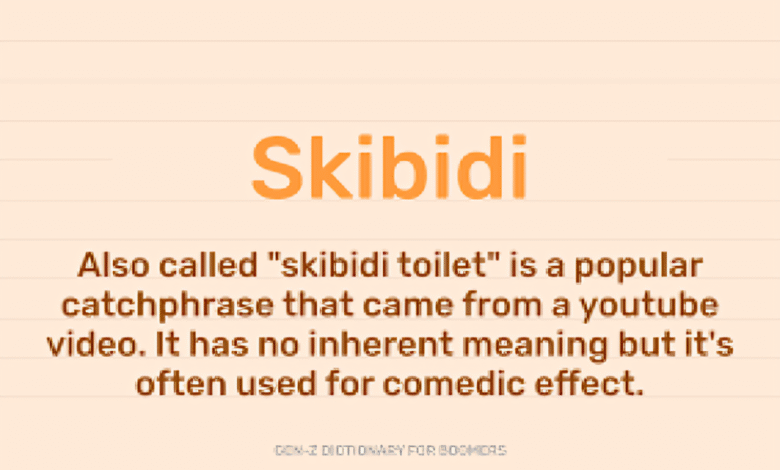Skibidi Meaning Decoding the Viral Internet Phenomenon

In the fast-paced world of digital culture, new trends emerge daily, captivating millions across the globe. One such trend that has taken the internet by storm is the term “Skibidi”. From quirky dance moves to animated videos and catchy tunes, “Skibidi” has become a cultural marker, particularly among younger internet users. But what exactly is the Skibidi meaning? Where did it come from, and why is it suddenly everywhere?
This comprehensive guide will decode the full scope of the Skibidi meaning, including its origin, evolution, cultural impact, and relevance in today’s internet landscape.
H2: The Origins of Skibidi Meaning
H3: Early Uses in Pop Culture
The earliest notable use of the word “Skibidi” can be traced back to 2018, when Russian rave band Little Big released a song titled Skibidi Meaning. The track quickly gained international recognition, fueled by its energetic beat, humorous lyrics, and a now-iconic dance that featured rapid hand and hip movements. The word “Skibidi” in the song doesn’t translate to anything literal—it functions more as a nonsensical sound meant to be catchy and fun.
H3: Viral Dance and Internet Memes
The “Skibidi” dance challenge became an internet sensation shortly after the song’s release. Millions of users across platforms like TikTok, Instagram, and YouTube recreated the dance, often in humorous or creative ways. The catchphrase “Skibidi bop yes yes yes” became a meme in its own right, with many users adding their own spin to the dance or remixing the original track.
H2: Skibidi in 2023 and Beyond – The Skibidi Toilet Phenomenon
H3: What Is Skibidi Toilet?
While the original Skibidi meaning was rooted in music and dance, a more recent and perhaps even more viral interpretation has emerged: the Skibidi Toilet series. Created by the YouTube channel DaFuq!?Boom!, this animated video series features bizarre and surreal characters—most notably, human heads popping out of toilets—engaged in an absurd war against agents with camera heads.
The Skibidi Toilet series blends absurdist humor, CGI animation, and fast-paced editing. It’s tailored to the meme-driven, short-attention-span culture of Gen Alpha and Gen Z, and it has amassed millions of views and subscribers worldwide.
H3: How Skibidi Toilet Redefined the Term
With the rise of the Skibidi Toilet series, the term “Skibidi” took on a new meaning. No longer just a quirky dance tune, “Skibidi” has become a symbol of digital absurdism. For many, it now represents a whole genre of internet content: chaotic, meme-based, and algorithm-optimized for maximum virality.
H2: The Linguistic and Cultural Interpretation of Skibidi
H3: Is Skibidi a Real Word?
The short answer is no—”Skibidi” is not a real word in any major language. It is considered a nonsense word, much like “shoop,” “la-la-la,” or “bam.” Its purpose is phonetic; it sounds fun, rhythmic, and memorable. The Skibidi meaning lies not in its literal translation, but in its emotive and cultural resonance.
H3: Symbolism in Internet Culture
In meme culture, nonsensical words often hold deeper symbolic value. “Skibidi” has come to embody themes of rebellion against logic, the breaking of creative boundaries, and a celebration of the absurd. This mirrors the broader Gen Z and Gen Alpha tendency to embrace irony and chaos in digital content.
H2: Skibidi Meaning in Different Contexts
H3: In Music and Dance
In its original context via Little Big, “Skibidi” is pure entertainment. It was designed to be catchy, to stick in your head, and to encourage people to move. It did not seek to convey any deep or intellectual message—rather, its meaning is embodied in movement and energy.
H3: In Animation and YouTube Shorts
With Skibidi Toilet, the meaning shifts drastically. It becomes part of a bizarre narrative where human toilet heads battle robotic enemies. Here, “Skibidi” becomes an identifier—a genre, a fandom, a style. It’s absurdist performance art for the digital age.
H3: In Memes and Slang
Among younger users, “Skibidi” can now function as an adjective. You might hear someone say something is “so Skibidi” to describe something bizarre, chaotic, or hilarious in an unexpected way.
H2: Why Has Skibidi Become So Popular?
H3: Algorithmic Virality
Platforms like TikTok and YouTube Shorts reward fast, visually stimulating, and emotionally engaging content. The Skibidi Toilet series and similar content are designed with this in mind—short episodes, minimal dialogue, exaggerated animations, and unpredictable twists.
H3: Appeal to Younger Audiences
Children and young teens are particularly drawn to content that defies logic and expectations. The chaotic nature of Skibidi videos makes them shareable and rewatchable, fitting perfectly with the humor style of Gen Alpha.
H3: Cultural Reset Moments
Much like other internet phenomena such as the Harlem Shake or Gangnam Style, Skibidi represents a cultural reset—a moment where internet users collectively embrace and amplify a shared joke or aesthetic.
H2: The Psychological Impact of Skibidi
H3: Dopamine Loops
Skibidi content taps into dopamine-driven engagement loops—bright colors, fast cuts, unexpected events. This keeps viewers, especially younger ones, hooked and coming back for more.
H3: Meme Literacy
Understanding Skibidi content requires a certain level of meme literacy. The more versed you are in internet culture, the more you recognize the references, subversions, and layers of humor.
H2: Skibidi in the Classroom and Home
H3: Concern Among Parents and Educators
While the Skibidi trend may be harmless fun, it has raised concerns among educators and parents. Some worry that the nonsensical and often grotesque imagery in Skibidi Toilet videos could negatively impact younger children, especially if consumed excessively.
H3: Balancing Entertainment and Education
Experts recommend that parents engage with their kids to understand the content and context. Used in moderation, Skibidi content can even be a springboard for discussing media literacy and online behavior.
H2: The Future of Skibidi
H3: Will Skibidi Stay Relevant?
Trends on the internet tend to burn bright and fade fast. However, Skibidi Meaning has evolved so dramatically in such a short time that it may become a lasting cultural reference, much like “Rickrolling” or “Pepe the Frog.”
H3: Possible Expansion
With merchandise, spin-offs, and fan-made content already in circulation, it’s likely that Skibidi will evolve further—possibly branching into gaming, NFTs, or even mainstream animation.
FAQs About Skibidi Meaning
Q1: What is the Skibidi meaning in simple terms?
In simple terms, Skibidi is a nonsensical word originally popularized by a Russian song and later transformed into a cultural phenomenon through memes, dances, and a viral YouTube animated series called Skibidi Toilet. It doesn’t have a real-world translation but conveys fun, absurdity, and internet culture.
Q2: Who created the Skibidi Toilet series?
The Skibidi Toilet series was created by the YouTube channel DaFuq!?Boom!, which specializes in surreal CGI-based short videos.
Q3: Why do kids like Skibidi content so much?
Kids are drawn to Skibidi content because it’s fast-paced, visually stimulating, humorous, and often unexpected. It aligns well with the quick-consumption style of platforms like YouTube Shorts and TikTok.
Q4: Is Skibidi bad for kids?
Not inherently. However, like all screen time, it should be consumed in moderation. Parents are encouraged to co-watch and discuss the content with children to ensure they understand what they are watching.
Q5: Is “Skibidi” a slang term now?
Yes. Among younger internet users, “Skibidi” has become slang for something chaotic, funny, or absurd—e.g., “That video was so Skibidi!”
Conclusion
The Skibidi meaning has transformed significantly over the years. What began as a quirky dance song by Little Big has evolved into a multi-faceted internet phenomenon. From meme challenges to a surreal animated series that has captivated Gen Z and Gen Alpha audiences, “Skibidi” now stands as a symbol of digital absurdity, cultural experimentation, and the limitless creativity of the online world.
Whether you view it as meaningless noise or modern performance art, one thing is clear: Skibidi is a defining moment in the ever-shifting landscape of internet culture. As with all viral phenomena, understanding it gives us greater insight into how communities, humor, and communication evolve in the age of algorithms.




